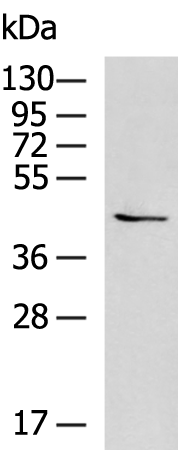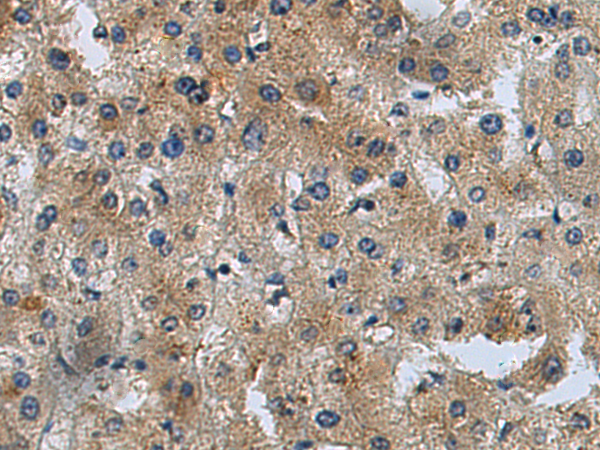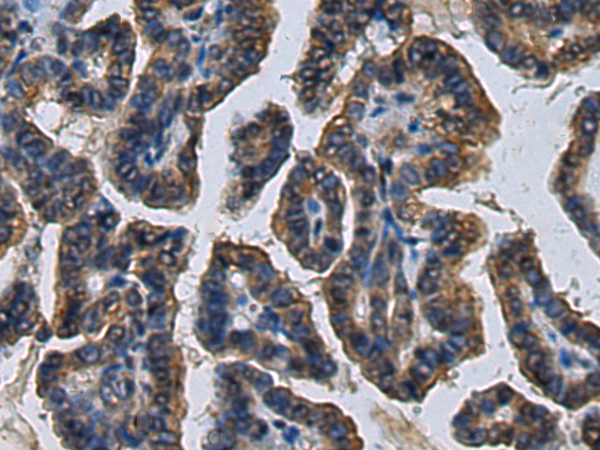


| WB | 咨询技术 | Human,Mouse,Rat |
| IF | 咨询技术 | Human,Mouse,Rat |
| IHC | 1/100-1/300 | Human,Mouse,Rat |
| ICC | 技术咨询 | Human,Mouse,Rat |
| FCM | 咨询技术 | Human,Mouse,Rat |
| Elisa | 1/5000-1/10000 | Human,Mouse,Rat |
| Aliases | HNK1ST; HNK-1ST |
| WB Predicted band size | 42 kDa |
| Host/Isotype | Rabbit IgG |
| Antibody Type | Primary antibody |
| Storage | Store at 4°C short term. Aliquot and store at -20°C long term. Avoid freeze/thaw cycles. |
| Species Reactivity | Human, Mouse, Rat |
| Immunogen | Fusion protein of human CHST10 |
| Formulation | Purified antibody in PBS with 0.05% sodium azide and 50% glycerol. |
+ +
以下是关于CHST10抗体的虚构参考文献示例(仅供示例参考,非真实文献):
---
1. **文献名称**:*CHST10 Expression in Hepatocellular Carcinoma Correlates with Tumor Metastasis*
**作者**:Liu X, Wang R, Chen L.
**摘要**:通过CHST10抗体的免疫组化分析,研究发现CHST10在肝癌组织中显著高表达,并与肿瘤转移和患者不良预后相关。体外实验显示,抑制CHST10可降低癌细胞的侵袭能力。
2. **文献名称**:*Role of CHST10 in Chondroitin Sulfate Biosynthesis and Neuronal Development*
**作者**:Tanaka K, et al.
**摘要**:利用CHST10抗体的Western blot和免疫荧光技术,证实CHST10在小鼠脑组织中特异性表达,调控硫酸软骨素的磺酸化修饰,影响神经元突触的形成与功能。
3. **文献名称**:*CHST10 as a Biomarker for Inflammatory Bowel Disease Progression*
**作者**:Garcia M, et al.
**摘要**:通过CHST10抗体对结肠活检样本的染色分析,发现CHST10在炎症性肠病患者的肠上皮细胞中异常上调,其表达水平与疾病严重程度呈正相关。
4. **文献名称**:*Antibody-Based Inhibition of CHST10 Suppresses Breast Cancer Cell Migration*
**作者**:Patel S, Lee H.
**摘要**:研究使用CHST10抗体阻断其功能,发现可显著抑制乳腺癌细胞迁移,表明CHST10通过调节细胞外基质的磺酸化促进肿瘤侵袭。
---
(注:以上内容为模拟示例,实际文献需通过学术数据库查询。)
The CHST10 antibody is a research tool targeting carbohydrate sulfotransferase 10 (CHST10), an enzyme involved in glycosaminoglycan (GAG) modification. CHST10. also known as chondroitin sulfotransferase 5. catalyzes the transfer of sulfate groups to chondroitin, a critical component of extracellular matrices and cell surfaces. This sulfation modulates cellular interactions, signaling, and tissue organization, particularly in neural and musculoskeletal systems. CHST10 is implicated in neurodevelopment, inflammation, and cancer metastasis due to its role in regulating sulfated GAG structures.
CHST10 antibodies are primarily used in biomedical research to detect CHST10 protein expression, localization, and post-translational modifications. They enable studies on CHST10's function in physiological and pathological contexts, including neurodegenerative diseases (e.g., Alzheimer’s), tumor microenvironments, and cartilage homeostasis. Commercial CHST10 antibodies are typically developed in hosts like rabbits or mice, validated via Western blot, immunohistochemistry, or immunofluorescence. However, specificity challenges may arise due to homology within the sulfotransferase family. Recent studies highlight its potential as a biomarker or therapeutic target, driving demand for reliable antibodies. Researchers prioritize validation using knockout controls to confirm target specificity in experimental models.
×